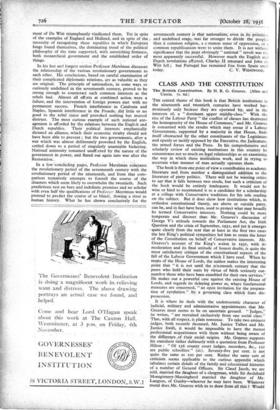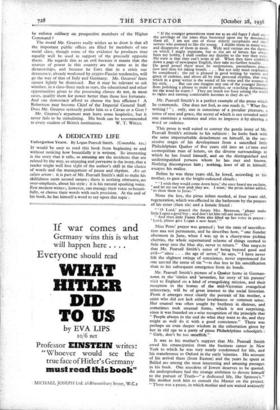CLASS AND THE CONSTITUTION
THE central theme of this book is that British institutions in the nineteenth and _ twentieth_ centuries have worked har- moniously only because they are operated by, and in the interests of, a " dominant upper middle-class." With the rise of the Labour Party " the conflict of classes has destroyed the homogeneity of the House of Commons," and Mr. Greaves is concerned_ with the results which may ensue if a Labour Government, supported by a majority in that House, finds itself obstructed by the other constituents of the Legislature and openly or tacitly opposed by the Executive, the Judicature, the armed forces and the Press. In his comprehensive and scholarly review of existing institutions in this country he concentrates not so much on legal relationships as on examining the way in which these institutions work, and in trying to ascertain what manner of man actually operates them.
The book is from one point of view a contribution to academic literature and from another a distinguished addition to the literature of party politics.. There will not be wanting critics to say that it falls between two stools, but such a criticism of the book would be entirely inadequate. It would not be wise or kind to recommend it to a candidate for a scholarship at a college with Conservative traditions for his sole reading on the subject. But it does show how institutions which, in orthodox constitutional theory, are above or outside party, can be, and in fact have been, used to protect what may broadly be termed Conservative interests. Nothing could be more temperate and discreet than Mr. Greaves's . discussion of George V's attitude towards the Parliament Act, the Irish Question and the crisis of September, 1931, and yet it emerges - quite clearly from the text that at least in the first- two cases the late King's political sympathies led him to strain the letter of the Constitution on behalf of Conservative interests. Mr. Greaves's account of the King's action in 1931, with its moderation and its final attitude. of honest doubt, is, quite the most satisfactory critique of the constitutional aspects of the fall of the Labour Government which I have read. When he treats of the House of Lords, the author makes the interesting point that " it is not until the nineteenth century that the peers who hold their seats by virtue of birth seriously out- number those who have been ennobled for their own services." He makes out a powerful case against the existing House of Lords, and regards its delaying -power as, where fundamental measures are concerned, " an open invitation for the prepara- tion of revolution '% by a governing class which fears dis- possession.
It is where he deals with the undemocratic character of judicial, military and administrative appointments that Mr. Greaves most seems to be on uncertain ground. " Judges," he writes, " are recruited exclusively from one social class." That, with all respect, is plain nonsense. To take two eminent judges, both recently deceased, Mr. Justice Talbot and Mr. 'Justice Swift, it would be. impossible to have the merest professional acquaintance with them without being aware of the difference ..,of their social origins, Mr. Greaves supports his statement rather dubiously with a quotation from Professor Hilton : " Of 156 county court judges, recorders, &c., 122 are public schoolites " (sic). Seventy-five per cent. is not quite the same as too per cent. Rather the same sort of criticism seems applicable to the curious appendix which tabulates certain details of the family and educational histories of a number of General Officers. Sir Claud Jacob, we are told, married the daughter of a clergyman, while Sir Archibald Montgomery-Massingberd married the daughter of Mr. Langton, of Gunby—whoever he may have been. Whatever moral does Mr. Greaves wish lis to dtaw from all this ? Would
he enforce celibacy on prospective members of the Higher Command The moral Mr. Greaves really wishes us to draw is that all the important public offices are filled by members of one social class, though some of the evidence he produces may equally well be used in support of the precisely opposite thesis. He regards this as an evil because it means that the sources of power in this country are the same as in the dictatorships, and because he fears that in a crisis our democracy, already weakened by crypto-Fascist tendencies, will go the way of that of Italy and Germany. Mr. Greaves' fears cannot lightly be dismissed. But it may be relevant to ask whether, in a class-State such as ours, the educational and other opportunities given to the possessing classes do not, in most cases, qualify them for power better than those less fortunate. And can democracy afford to choose the less efficient ? A Robertson may become Chief of the Imperial General Staff. Does Mr. Greaves seriously prefer him to a Cavan or a Gort ?
Mr. Greaves's argument may leave some loopholes, but it never fails to be stimulating. His book can be recommended
to every student of British institutions. W. T. WELLS.

























































 Previous page
Previous page